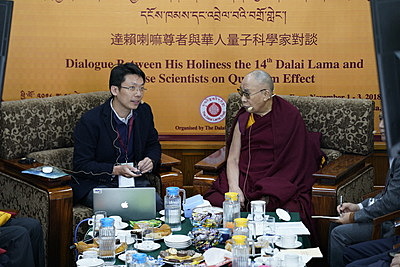In early November of 2019, distinguished Professor Yueh-Nan Chen in the Department of Physics at NCKU traveled to India with renowned Taiwanese scholars, including the former president of Academia Sinica, Yuan-Tseh Lee, to take part in a dialogue on quantum physics with the spiritual leader of Tibet, the Dalai Lama. He described the dialogue as “a crucial meeting between science and religion and a very worthwhile trip”.
Yueh-Nan Chen was youngest of the Chinese scientists taking part in the dialogue as well as a devout Buddhist. When Chen used the phrase “up, down, and both up and down” to explain the principle of quantum superposition, His Holiness (a very attentive listener) was curious as to whether this meant “both yes and no”. From time to time, His Holiness made responses from the Buddhist perspective, thereby creating a very relaxed atmosphere and warm interactions.
The humor and affability of His Holiness left a deep impression on Yueh-Nan Chen, who remarked on his open-mindedness and willingness to communicate. His Holiness has been talking with scientists for more than 30 years; however, this was his first dialogue with Chinese scientists and his first discussion on quantum physics. His Holiness has benefited considerably from his discussions with Western scientists; however, few of them understood Buddhist philosophy. The similar cultural foundation of the participants in this discussion promoted a deeper mutual understanding. “His Holiness has always had considerable admiration for science, and believes that if a religious edict is disproven scientifically, then it should be amended.”
Before departing, Yueh-Nan Chen asked His Holiness whether an understanding of quantum mechanics would help with his practices and whether this dialogue had met his expectations. His Holiness gave affirmative responses to both of these questions and said that on a certain level, quantum scientific thinking helped his meditation.
Yueh-Nan Chen pointed out that the discoveries in quantum physics have had a profound impact in the field of Philosophy. “Dependent arising and emptiness in nature” is a Buddhist assertion that nothing exists objectively. This is similar to some interpretations of quantum phenomena. Yueh-Nan Chen humbly explained that there were many deeper levels of Buddhist philosophy, which he did not fully understand, and that this dialogue has aroused his desire to further explore the similarities and differences between Buddhism and quantum physics.
Yueh-Nan Chen recalled that their meeting was held in a paradise-like Thekchen Chöling Monastery, Dharamshala, at an altitude of 1500 m in Himachal Pradesh, India. The three-day event involving 500 - 600 people was broadcast live in India, Taiwan, Hong Kong, and Beijing. It was also simultaneously translated into Chinese.
Yueh-Nan Chen has an abundance of academic experience, including Center Scientist of Quantum Information Science Research at the National Center for Theoretical Sciences. His areas of expertise include quantum transport, quantum information, and quantum biology. He has made significant contributions to the field and received many awards, such as the NCTS Young Theoretical Scientist Award, the K. T. Li Young Researcher Award, and the Ta-You Wu Memorial Award. Aside from his efforts in scientific research, he is also a dedicated volunteer. He and his students offer after-school tutoring to children from low-income families every Friday, and he also participated in disaster relief and volunteer services in Malaysia and in disaster areas of the 311 Eastern Japan Earthquake.
Source: NCKU News Center
Photo credit: Office of His Holiness the Dalai Lama, NCKU News Center
